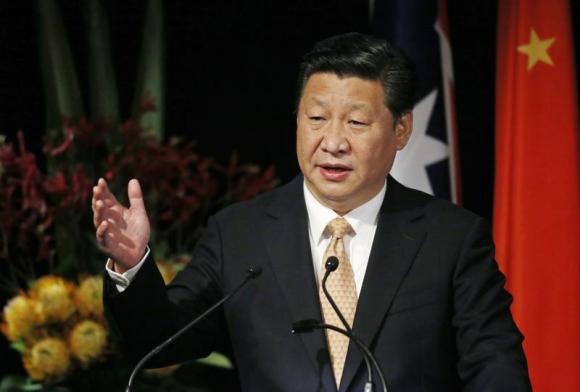From Pakistan, China’s foreign minister Wang Yi announced on Thursday that President Xi Jinping will be visiting the South Asian nation “at the earliest possible date” this year. The scheduled state visit marks the first of its kind to be made by a Chinese leader in nine years. Michael Martina at Reuters reports:
“Wang Yi said President Xi Jinping will make a state visit to Pakistan at the earliest possible date this year,” a statement posted to the Foreign Ministry’s website late on Thursday said.
“This will be President Xi’s first visit to Pakistan as head of state, and the first visit by a Chinese president in nine years,” Wang said, adding that China and Pakistan are “iron-clad pals and true friends”.
“This is not a dictate from heaven nor was it achieved in a single day. It illustrates how bilateral relations have weathered the trials of history and established a high degree of mutual understanding, trust and assistance,” Wang said.
[…] Last year, Xi visited India, Sri Lanka and the Maldives. [Source]
Xinhua reports that China’s diplomatic relationship with Pakistan ranks high on the country’s agenda, particularly as Chinese leaders work to actualize the China-Pakistan Economic Corridor and Silk Road Economic Belt initiative that would connect China with its neighbors in Central and South Asia.
Wang stressed that China takes Pakistan relationship high on its diplomatic agenda and the Chinese people take Pakistani people as their most trustworthy friends.
“China is working vigorously to promote the initiative put forth by President Xi Jinping to build the Silk Road Economic Belt and the 21st Century Maritime Silk Road.
“If comparing this ‘One Belt and One Road’ initiative to a symphony that is participated by all countries and produces benefits to all participants, then China-Pakistan Economic Corridor is the glorious melody in the chapter one of this symphony,” he said.
Wang described the China-Pakistan relationship as one that is as close as lips and teeth because the two countries are connected by same mountains and waters.
“The Chinese people have made a special term for Pakistan – ‘ Iron Pak,’ which means Pakistan is the ‘iron friend’ of the China, ” as the two countries enjoy all weather friendship and have conducted all-round cooperation. [Source]
Pakistan’s president Mamnoon Hussain also expressed his desire to strengthen his country’s diplomatic ties with China. Xinhua reports:
During their meeting, Hussain hailed the firm friendship between the two countries and said Pakistan anticipates a state visit by Chinese President Xi Jinping at an early date, which would greatly promote the development of Pakistan-China relations.
The Pakistani president pledged his country would continue to firmly back China’s stance on matters related to the country’s core interests, including issues regarding China’s Taiwan and Tibet.
Hussain expressed the wish for speedy construction of Pakistan- China Economic Corridor with China, adding that his country would firmly combat terrorism and spare no effort for the security of Chinese nationals working in Pakistan.
Pakistan is willing to enhance cooperation with China to push forward reconciliation and reconstruction in Afghanistan, added the president. [Source]
During his visit to Pakistan this week, foreign minister Wang Yi expressed China’s intent to support peace talks between the Afghan Taliban and the government in Kabul. Reuter’s Maria Golovnina reports:
Afghanistan and its Western backers have been trying to bring moderate Taliban figures to the negotiating table to end years of war in the country. Pakistan is key to the process because of its historic ties to the Taliban leaders, who have used the Pakistani border region as a safe haven.
“We will support the Afghan government in realising reconciliation with various political factions including the Taliban,” Wang told reporters.
“China is ready to play its constructive role and will provide necessary facilitation at any time if it is required by various parties in Afghanistan.”
Wang said he had a “strong sense” that Pakistan had a “strong will to take a constructive part in the resolution of this matter.” [Source]
China’s increasingly active role in Afghanistan and its neighboring countries reflects the changing geopolitics of the region and China’s potential emergence as a regional leader. Jeremy Page, Margherita Stancati, and Nathan Hodge report for the Wall Street Journal:
In December, representatives of the U.S., China and Afghanistan met for private talks in London, the first time the three countries convened to seek ways to forge peace in Afghanistan, a senior U.S. official said.
[…] China’s move toward the role of mediator signals a foreign policy shift in Beijing—for decades focused on domestic issues—that could recalibrate the geopolitics of Central Asia and test China’s capacity as a regional leader, Western officials said.
“In a certain sense, they’re competing with the U.S. for success in Afghanistan. They want to prove they can do it better,” said David Sedney, a former U.S. diplomat in Beijing and Kabul and deputy assistant secretary of defense for Afghanistan, Pakistan and Central Asia from 2009 to 2013.
[…] The initiative in Afghanistan reflects Mr. Xi’s drive to enhance regional diplomacy and China’s international standing, experts say, as well as challenge the U.S. as the primary underwriter of regional peace and prosperity. [Source]








